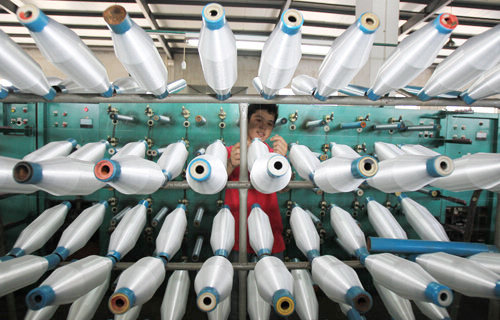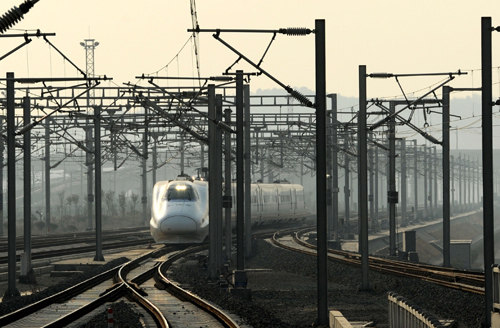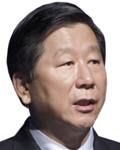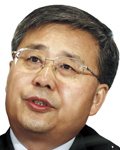|
 |
|
The production line of Jiangsu Nantong NTEC Textile Co. (CFP) |
Small and medium-sized enterprises (SMEs) are not faring well this year. Because of tightened bank lending to deal with inflation, many SMEs faced the risk of cash flow collapse. For those SMEs that borrowed from private lenders with higher interest rates the weakened overseas demand and sluggish market became unbearable. From the middle of the year a massive collapse of SMEs was reported in export-oriented southeast coastal regions.
A number of SME bosses in Wenzhou, Zhejiang Province ran away to avoid debt. According to the Xinhua News Agency, from April to the end of September, at least 90 company owners in Wenzhou fled, causing their companies to close. Twenty six of those incidents occurred in September alone.
To provide support to these burgeoning businesses China revised its standards for SMEs in July. One of the most important breakthroughs of the revision is the inclusion of a new category of SMEs: micro enterprises. Formulating new division standards for SMEs aims at facilitating research and the implementation of supporting policies for SMEs, strengthening differentiated guidance and promoting SME development.
On October 12 the State Council pledged stronger financial and fiscal support to small and micro enterprises. The State Council required commercial banks to strengthen lending to small and micro enterprises, especially those whose credit limits are below 5 million yuan ($785,000).
The Ministry of Finance announced on December 9 that it will cut corporate income tax by half for micro and small enterprises from January 1, 2012 to December 31, 2015.
November 9 will be a memorable day in China's anti-monopoly history. The National Development and Reform Commission (NDRC) began probing China Telecom and China Unicom for allegedly taking advantage of their dominant positions regarding broadband access to suppress competition from rivals and charging high fees, CCTV reported that day.
This is the first case involving large state-owned enterprises. The two telecom giants, which control two thirds of the country's broadband business, will face penalties of up to 10 percent of annual revenues if found guilty.
Despite having the world's largest Internet population of 485 million, China's average broadband speed only ranks 71st in the world, while average costs are three to four times those of developed countries.
Although the investigation is still in progress, the move may clear the way for the government to broaden the scope of its anti-monopoly law. Public opinion has been critical of perceived monopolistic practices among large companies. But anti-monopoly cases have mainly involved foreign companies' mergers and acquisitions of domestic counterparts since the implementation of the anti-monopoly law in 2008.
 |
|
A bullet train makes its way to Nanjing South Station (CFP) |
On June 30 the Beijing-Shanghai High-Speed Railway, with a total investment of 220.9 billion yuan ($34.8 billion), started operations on its 1,318-km-long line. The railway cut the travel time between the two biggest cities from 12 hours to five.
The Beijing-Shanghai High-Speed Railway can also accelerate the integration of the Bohai Sea Rim and the Yangtze River Delta economic zones and promote balanced, sustainable development of urbanization and the economy.
But tragedy stuck on July 23 when two high-speed trains collided on an elevated track near Wenzhou, Zhejiang Province, leaving 40 people dead and 191 injured, causing China to reassess its high-speed rail development.
After the accident the Ministry of Railways launched a nationwide safety check on its high-speed railways to eliminate risks and lowered the speed of its high-speed railway service. Other lines also joined the speed reduction. From August 28 the top speed of the Shanghai-Hangzhou bullet train dropped to 300 km per hour from 350 km per hour.
In August and September inspections of 49 projects and 6,000 km of high-speed rail lines were conducted.
On August 12, China's state-owned train maker, China CNR Corp. (CNR), recalled 54 trains it supplied for the high-speed rail link between Beijing and Shanghai to be investigated for equipment failure.
 |
 |
 |
|
Shang Fulin |
Xiang Junbo |
Guo Shuqing |
On October 29 China changed the top positions at its three financial regulatory bodies: the China Banking Regulatory Commission (CBRC), China Securities Regulatory Commission (CSRC) and China Insurance Regulatory Commission (CIRC).
Shang Fulin, former CSRC Chairman, was appointed CBRC Chairman; Guo Shuqing, former Board Chairman of China Construction Bank, was appointed CSRC Chairman; and Xiang Junbo, former Board Chairman of Agricultural Bank of China, was appointed CIRC Chairman. Liu Mingkang, former CBRC Chairman, and Wu Dingfu, former CIRC Chairman, retired from their former positions.
The three new chairmen face various challenges such as maintaining stability of the financial system, the yuan's appreciation, local government debt and IPO reform. Moreover, with the domestic real estate market headed in a downward trajectory, maintaining financial stability will play an active role in stabilizing the economy. | 